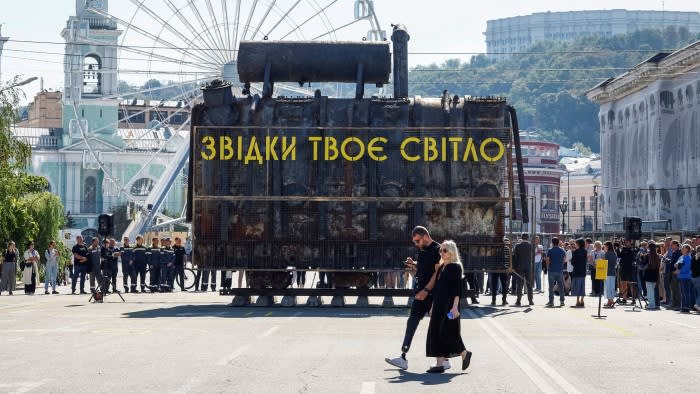Stay informed with free updates
Simply sign up to the War in Ukraine myFT Digest — delivered directly to your inbox.
Ahead of Ukraine’s third and most testing winter of the war, criticism is mounting over the government’s slow response to Russia’s attacks on the energy grid and its priorities when rebuilding.
Energy minister German Galushchenko has come under fire for delaying by two years efforts to decentralise power generation so it is less vulnerable to Russian attacks. The energy ministry started taking steps towards building smaller power stations only this summer, with the government announcing cheap loans to attract investors in these projects.
But critics say those efforts should have started in 2022 soon after Russia’s full-scale invasion when Moscow homed in on Ukraine’s energy grid and that hundreds of smaller gas-powered stations or renewable energy projects could have been built in this period.
“The energy ministry is not interested in decentralisation. Rather, they are interested in centralisation, they want as much of energy sector, particularly generation, under their state companies,” said an energy official.
Galushchenko, say experts and officials, has instead lobbied for the construction of large and costly nuclear reactors, which take between seven to 10 years to build. Before becoming minister in 2021, Galushchenko was vice-president of the state nuclear company, Energoatom.
The ministry told the Financial Times it had developed a strategy and created the conditions for decentralisation but declined to give examples, citing wartime restrictions. It added that developing nuclear generation would “ensure the country’s recovery needs and energy stability in the future.”
Plans for decentralisation efforts put forward in 2022, when Russia first started hitting the system, were ignored, said Victoria Voytsitska, an energy expert and former parliamentary energy committee member. “We’ve seen [Galushchenko] pushing the project of building new nuclear reactors . . . it won’t help us to survive this coming winter and the next winter.”
Volodymyr Omelchenko, director of energy programmes at the Razumkov Centre think-tank, told the Financial Times that aside from being less vulnerable to attack, smaller decentralised power stations take around a year and half to build and are “much cheaper” than repairing or building large generation facilities.
After the devastating attacks this spring, which destroyed 9GW of the country’s 19GW energy generation, Ukrainian energy companies have repaired some damaged power stations and built protective shelters to shield them from further strikes.
Ukraine also increased its electricity imports from Europe to compensate for the shortfall, which according to Greek Prime Minister Kyriakos Mitsotakis led to a spike in prices in southern Europe.
But even so, in the best-case scenario, the country will face an average of five hours a day without electricity this winter, according to Ukraine’s biggest energy company DTEK — and that is if Russia does not attack again and temperatures do not go below -15C.
“Ukraine has a short-term plan to get through this winter, but to guarantee our energy security in winters to come we must decentralise Ukraine’s energy system,” said DTEK’s chief executive Maxim Timchenko.
Ukraine’s three remaining nuclear plants account for nearly half of the country’s energy generation and two reactors will need to be replaced in 10 years’ time.
In January, Galushchenko announced that Energoatom would start building four new reactors. But it seems unlikely the company, which has been embroiled in corruption scandals, will be able to attract the billions of dollars needed. Galushchenko’s plans to purchase used Russian technology from Bulgaria for $600mn were halted after protests from lawmakers this summer.
The only Ukrainian energy company to attract significant international financing is state-owned Ukrenergo. But after the controversial dismissal of its chief Volodymyr Kudrytskyi on September 3, continued investment hangs in the balance.
Kudrytskyi said the loans scheme for investors in small power plants, introduced in July, would bring tens of new players into the market and create competition for Energoatom — something the ministry sought to delay.
The principal concern for this winter is damage to the main power stations rather than substations, which are largely shielded by protective cover and are quick to repair, said Kudrytskyi.
“The deficit and blackouts are inevitable,” said Kudrytskyi. “It’s a question of how small or big they will be and this depends on how protected the power plants are. Air defence is absolutely critical and decentralisation should happen in parallel.”


